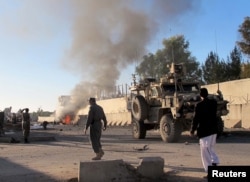The Taliban captured a key district in northern Afghanistan while the insurgent group kept national security forces under pressure in their bid to move closer to a provincial capital in the volatile south, officials confirmed on Monday.
The insurgents overran the district of Dahna Ghori in the Baghlan province after staging a coordinated offensive overnight, according to local officials and residents.
Taliban fighters are said to have seized weapons, including a long-range mortar cannon, as well as more than a dozen military vehicles from retreating Afghan forces, although authorities called it “a tactical retreat.”
Dahna Gohri was under siege for days before it fell to the Islamist insurgency and local officials say there were no reinforcements from the central government to push back the opposition. The district is just a few kilometers from the provincial capital of Pol-e-Khomri.
Key power supply lines importing electricity from the neighboring Central Asian republics pass through Baghlan. Last year’s Taliban advances in the province disrupted power supply to Kabul for weeks.
A Taliban spokesman, Zabihullah Mujahid, said the insurgents killed a number of Afghan security forces and captured 33 soldiers in several days of fighting before hoisting its white flag in Dahna Ghori. The militant group is known for releasing inflated claims and casualty tolls.
Baghlan borders the strategically important province of Kunduz, where the Taliban last year briefly seized control of its capital city.
Clashes elsewhere
Afghan officials also reported deadly clashes in the eastern Want Waygal border district but have not confirmed claims it has fallen to the Taliban.
The insurgents say they have seized the district in Nuristan province bordering Pakistan.
Intense fighting, meanwhile, has been raging in several districts of the largest Afghan province of Helmand. Assistance from U.S. military advisers coupled with drone strikes have so far enabled Afghan forces to defend the provincial capital of Lashkar Gah.
Afghan authorities blame traditional narcotics and criminal networks in poppy-growing Helmand for assisting in the Taliban advances. The largest Afghan province borders Pakistan.
Afghan officials have acknowledged that a specially trained commando-style insurgent unit capable of conducting night raids has also played a key role in Taliban advances in Helmand.
Aid workers have said that fighting in districts surrounding Lashkar Gah have blocked and delayed patients, including injured people, from reaching the city’s main hospital for critical needs.
Mullah Rasool group
Meanwhile, senior Taliban commanders who formed a breakaway faction last year have returned to the ranks of the main insurgency. The faction, led by Mullah Rasool, had engaged in deadly clashes with the main Taliban.
The return of top members of the Rasool group is being seen by some observers as a blow to Kabul’s efforts to exploit insurgent divisions and another sign that new Taliban chief Mawalvi Hibatullah is succeeding in reuniting splintered factions.
While the insurgency is making gains both militarily and politically, simmering political tensions in the Afghan national unity government in Kabul have concerned critics inside and outside of Afghanistan.
Afghan Chief Executive Abdullah Abdullah last week publicly criticized President Ashraf Ghani for allegedly not honoring commitments he made in a U.S.-brokered political deal that enabled the two election rivals to form a unity government.
Abdullah even went on to assert Ghani was not fit for the job.
The presidential office responded by calling the remarks counterproductive and “not in line with the spirit and principles that shape the foundation of governance.”
Both sides are accusing each other of undermining the working of the government. The political confrontation has raised questions about the future of an already fragile Afghan government.













